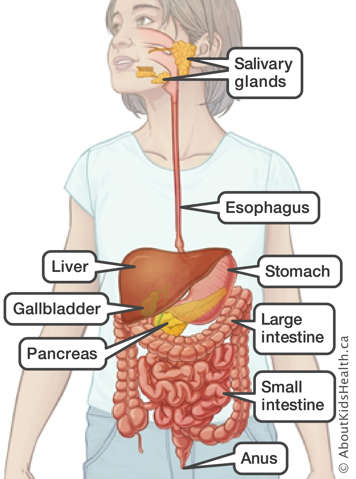
When children have chronic troubles with their digestive system and parents start looking for answers, they often get confused between irritable bowel syndrome (IBS) and inflammatory bowel disease (IBD). While many of the symptoms of these two conditions are similar, there’s actually a big difference between the two. These differences also include how each is diagnosed and treated.
Inflammatory bowel disease (IBD)
IBD is a disease that causes inflammation. There are two major types of IBD: ulcerative colitis, which mostly affects the colon, and Crohn’s disease, which can affect any part of the digestive system. IBD is caused by a combination of genetics, environmental factors, changes to the gut microbiome (bacterial living in the intestines) and a change in the immune system that makes the body attack its own digestive system, sometimes causing permanent damage. Although the range and severity of symptoms vary from child to child, IBD can be a very serious and debilitating condition.
Irritable bowel syndrome (IBS)
IBS is a syndrome affecting the bowel. It is probably not a single disease, but a combination of factors that cause a collection of symptoms. It does not cause inflammation and does not damage the digestive system. IBS is considered a so-called ‘disorder of gut-brain interaction’ (DGBI) meaning the digestive system looks normal but is not working as it should. It is likely sending and receiving jumbled nervous system messages to and from the brain, or the brain is interpreting those signals incorrectly. The cause of IBS is also unknown but stomach infections, stress, some foods and medications can trigger symptoms. While it does not cause damage to the bowel or body, IBS can also profoundly affect children and reduce their quality of life.
Symptoms
As mentioned above, many of the symptoms of both conditions overlap. Diarrhea, bloating, stomach pain and cramping are common to both. Changes in bowel movement routine, for example, periods of relatively normal bowel movements, followed by flare-up bouts of diarrhea, then back to normal, also occur in both.
IBS sufferers tend to get symptom relief after bowel movements. It is not known to lead to other conditions. IBD, however, is associated with weight loss and other potentially harmful complications such as malnutrition and poor growth in children.
Diagnosis
Do not try to diagnose either of these conditions yourself. If your child has these symptoms, take them to their health-care provider. They may perform tests, and your child may in turn be referred to a paediatric gastroenterologist, which is a physician specializing in digestive system conditions. Diagnosis is often made in IBS by ruling out other disease. IBD usually requires special tests such as a colonoscopy, ultrasound and/or MRI.
Keeping a detailed diary
One thing you can do is to keep track of what your child eats and when they eat it. Also keep track of other lifestyle issues you suspect may trigger symptoms. If you have a detailed daily diary like this, it will help not only with diagnosis but also with making changes in your child's life to reduce the impact of symptoms.
A proper diagnosis is very important. This is because the conditions are treated differently.
Treatment
Managing IBS
There is no cure for IBS, but symptoms can be managed through lifestyle and dietary changes. The specifics of these changes vary from child to child. You may have to try different things to discover what works for your child. If needed, your child’s health-care provider can prescribe medications for pain and for problems with bowel movements such as diarrhea, constipation, gas and urgency. Some common treatments of IBS include:
- Dietary changes such as removing processed or greasy foods from the diet, or a low FODMAPs diet.
- Probiotics (taken as a pill or powder).
- Cognitive behavioural therapy (by a mental health care provider) to improve the interpretation of signals sent between the brain and gut, and to reduce the risk of stress triggering gut symptoms.
- Specific types of antidepressant medications that also act to change the nervous system signals between gut and brain.
- Medications or natural foods that can reduce pain and bowel spasms.
Managing IBD
Although lifestyle and dietary changes may also be an important part of managing IBD, additional medical intervention is usually part of treatment. Depending on the specifics of the disease, this might include anti-inflammatory medications, a temporary liquid, or even an intravenous diet. In severe cases of IBD, surgery may be needed to remove the damaged colon (in ulcerative colitis) or a part of the small intestine (in Crohn’s disease).
For information on a new way to use technology to manage IBD, see the MyGut app from Crohn’s and Colitis Canada, available for iOS and Android (https://crohnsandcolitis.ca/Support-for-You/MyGut).
Living as normally as possible
Because neither condition has a cure, the goal is to reduce symptoms to achieve a high quality of life as much as possible. It will take a little commitment no matter what your child's diagnosis is. However, with the help of a reasonable diet, possibly some other lifestyle changes, and good medical care, most children can learn to manage symptoms and lead healthy lives. Creating a diary to help identify foods and behaviours that cause symptoms will go a long way in this regard.